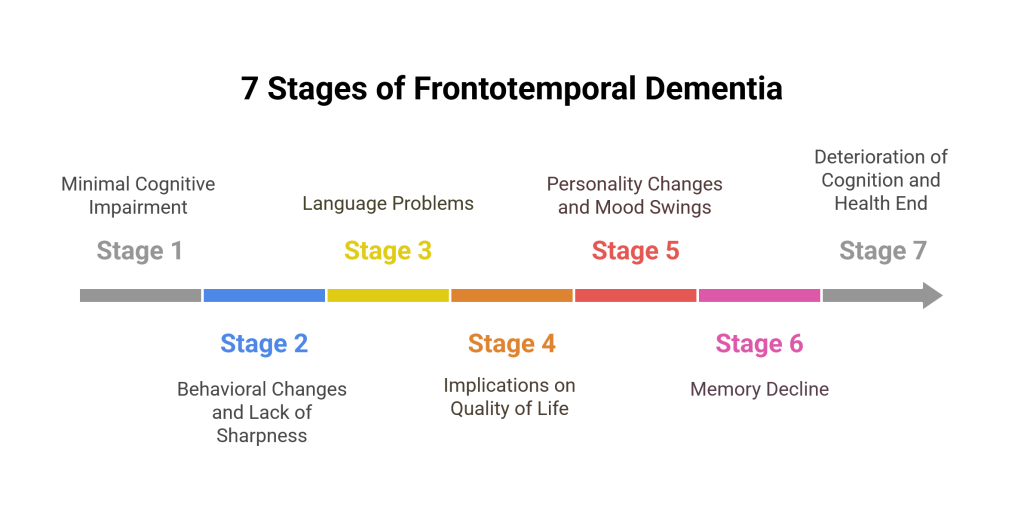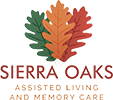Frontotemporal dementia is a neurodegenerative condition that primarily impacts language, behavior, and motor skills. It usually manifests much earlier in life than other forms of dementia; patients typically are between 45 and 65 years of age when they are affected. By grasping the stages through which FTD progresses, one can help both caregivers and the patients themselves.
We’ll explore the 7 stages of frontotemporal dementia (FTD) and what to expect at each stage. Understanding these stages will enable you to better support one another in navigating challenges and ensuring the best care. We’ll also discover top communities for assisted living in California that can provide the support you need.
What is Frontotemporal Dementia?
FTD is a consequence of abnormal protein deposition in the frontal and temporal lobes of the brain. These regions define languages and behavioral expressions, which is why most patients suffering from FTD typically exhibit symptoms of speech and personality. The cause of FTD cannot be determined; however, it is familially associated because one in eight patients diagnosed with FTD have a family history of the disorder. You should search for memory care facilities near me to provide the specialized support needed for individuals facing these challenges. Check out the link to learn more about memory care, its costs, benefits, and services.
Symptoms of Frontotemporal Dementia
FTD is characterized by a range of progressive symptoms, including:
- Personality Changes: They often remain unmotivated, indulge in impulsive behaviors, ignore personal hygiene, and have exaggerated emotional responses.
- Speech Issues: Patients often have difficulty finding the right words, thus cannot produce correct sounds, and might even speak slowly or muddle their words.
- Cognitive and Behavioral Changes: Affected individuals are incapable, in reality, of planning, organizing, or performing tasks effectively, which leads to distraction and loss of ability to focus.
- Add to this list: In the advanced stages of frontotemporal dementia (FTD), individuals may experience memory loss and movement difficulties, along with issues such as incontinence, swallowing problems, and muscle weakness.
7 Stages of Frontotemporal Dementia
FTD progresses gradually through seven consecutive stages. Some people will not develop into stage seven, and the pace of advancement varies with different persons.
Stage 1: Minimal Cognitive Impairment
At this stage, FTD is very covert. Patients may only realize them once the effects have already become significant. Most patients may experience strange behaviors, antisocial disorder, or speech difficulties. At this stage, their memories are not that affected. It does not grossly affect their quality of life, so people may not associate those behaviors with a neurological disease.
Stage 2: Behavioral changes and Lack of Sharpness
During this period, slight behavioral changes and acuteness of the mind are visible. An individual struggles to find the right words and performs odd or antisocial behavior. From these subtle changes, people may get an initial indication to detect FTD and how it gradually affects social or professional life.
Stage 3: Language Problems
The symptoms are steady and progressive in the middle-stage FTD. The person starts facing language problems that affect his work and personal relationships. The person may need to be made aware of this change, but outsiders typically notice these changes. There is a decline in home and work life.
Stage 4: Implications on Quality of Life
At this stage, symptoms are very oppressive to the quality of life. Speech deteriorates, and people cannot remember to use simple sentences in memory. More classic symptoms of dementia, such as forgetfulness and limitation in carrying out daily activities, often appear at this level. Driving and staying in places with which they are unfamiliar becomes burdensome.
Stage 5: Personality Changes and Mood Swings
In the mid-to-late stages of frontotemporal dementia (FTD), there are more pronounced effects on quality of life. Individuals may experience significant personality changes, increased mood swings, and cognitive decline, affecting language, problem-solving, and memory. Motor impairment can also occur, leading to stiffness and difficulties using limbs for daily activities. At this stage, caregivers often play a crucial role in supporting daily tasks.
Stage 6: Memory Decline
Late-stage FTD is very similar to Alzheimer’s dementia. Language and behavior are radically impaired, and the loss of memory results in extreme mental deterioration. The patient may be isolated inside himself, with little emotional, bodily, or verbal expression. Motor disturbances, including balance and reflex, make falls and accidents common. You can address the emotional toll of Dementia care by opting for a few strategies.
Stage 7: Deterioration of Cognition and Health End
In its final stages, FTD results in severe cognitive function impairments and further decline of the general health state of the individual. This requires a lot of care and support for patients. Severe illnesses like pneumonia are common causes of death in this condition, mainly because individuals become vulnerable to falls and accidents, thereby complicating recovery and general health.

Treatment Options for Frontotemporal Dementia
Frontotemporal dementia is a degenerative disease with no cure, unfortunately. Still, several treatments help alleviate the symptoms and improve the quality of life for the patient and the caregivers. Below, we present different treatment approaches, including medications, therapies, and support strategies.
Medications
- Antidepressants: Selective serotonin reuptake inhibitors (SSRIs) are often prescribed for a variety of forms of behavioral symptoms, such as depression, anxiety, and irritability. Examples include fluoxetine (Prozac), sertraline (Zoloft), and citalopram (Celexa).
- Antipsychotics: In more severe instances, antipsychotics may be required for agitation, aggression, and psychosis. However, the use of antipsychotics must be guarded since they can produce side effects as far-reaching as stroke in some aged patients. The most commonly used drugs as antipsychotics are risperidone (Risperdal) and olanzapine (Zyprexa).
- Cholinesterase Inhibitors and NMDA Receptor Antagonists: While primarily used for Alzheimer’s disease, these drugs may, from time to time, be prescribed to FTD patients for the management of cognitive symptoms. Some of these are donepezil (Aricept) and memantine (Namenda).
Therapies
- Speech Therapy: Speech and language therapists can be involved in training individuals with FTD to improve communication function. This can include using alternative means of communication, such as gestures or communication devices. Methods to enhance speech intelligibility also follow.
- Occupational Therapy: Occupational therapists allow patients to retain capabilities for their daily use and ensure they can perform independent tasks. Experts may provide techniques for overcoming cognitive and motor disabilities, recommend flexible tools, or change the home environment for safety.
- Physiotherapy: Physiotherapy can handle motor symptoms and ensure the mobility of the patient. Doctors can prescribe appropriate exercises and physical activities for patients based on their capabilities so that the person’s strength, balance, and coordination might be improved, thus reducing falls and other accidents.
Conclusion
Understanding the seven stages of FTD can help predict problems ahead of time and provide the needed support for FTD patients. Generally, there is no cure for this disease; however, early diagnosis and intervention can control and possibly manage the symptoms of the disease from establishing a life entirely of hopelessness.
Sierra Oaks provides advanced care and choices for treating patients, providing assistance, and the best available care and support. Search for memory care facilities near me, and let Sierra Oaks guide you with the best care options.





